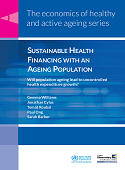Sustainable health financing with an ageing population: Will population ageing lead to uncontrolled health expenditure growth? (2019)

Download
The third policy brief in the Economics of Healthy and Active Ageing series looks at the long-term implications of population ageing for health spending growth. With the number and share of older people in the population increasing in nearly every country, there is much concern that this will translate into significantly higher growth in health spending in the future given that older people, on average, have higher health care costs than younger counterparts. Yet, a closer look at the evidence suggests this is unlikely to transpire, irrespective of the current and future age structure of a country.
In this brief, the authors use historical data on per person health spending by age group to develop a set of projections on health care spending growth through 2060 due to population ageing for a) countries that already have a large share of the population at older ages and b) countries with relatively younger populations that are undergoing rapid population ageing. Hypothetical scenarios are also explored in recognition that health spending by age patterns might vary in the future. These scenarios are intended to approximate 1) an increase in demand and a concomitant increase in the volume of health services provided to older people; 2) an increase in the intensity of services for older people; 3) the introduction of a new high- cost medicine aimed primarily at older people; and 4) a structural change in which spending on long-term care (including health and social care) is covered by public health budgets.
These analyses find that population ageing is not, and will not become, a major driver of growth in health expenditures. Moreover, they suggest that in countries where age demographics are changing but the size of the older population is not yet large, the costs of improving coverage and access to services for older people is likely to be manageable and now is a good time to begin investing in the health system while the population is relatively young.
However, while population ageing will not become a main driver of health expenditure growth, policy choices related to how health services are delivered, the prices paid (or negotiated) for services, medicines and technologies, and volumes of care will ultimately determine health spending by age trends. The authors conclude by considering policy options that can be implemented to target these factors, helping to limit future growth in health expenditures within a context of population ageing.
This brief was produced jointly with the WHO Centre for Health Development, Kobe, Japan.



